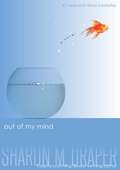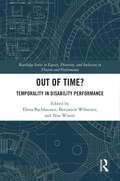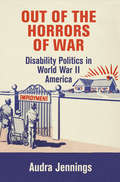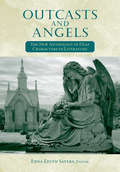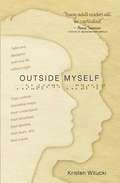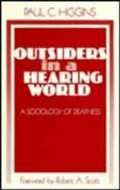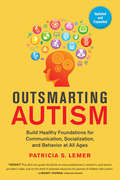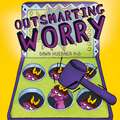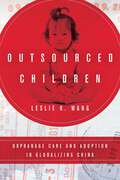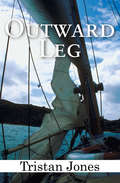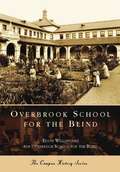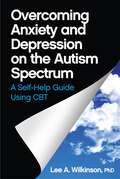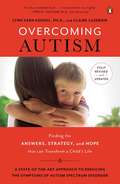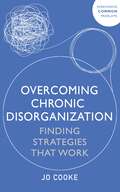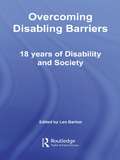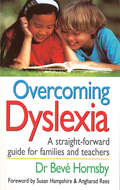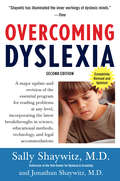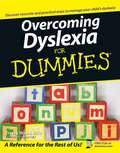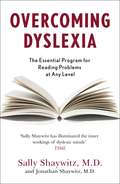- Table View
- List View
Out of My Mind (The Out of My Mind Series)
by Sharon M. DraperThis special movie tie-in edition showcases a new cover with an image from the original movie now available on Disney+! A New York Times bestseller for three years and counting! &“Unflinching and realistic.&” —Kirkus Reviews (starred review) From award-winning author Sharon Draper comes a &“gutsy, candid, and compelling&” (School Library Journal, starred review) story that will forever change how we all look at anyone with a disability, perfect for fans of RJ Palacio&’s Wonder.Eleven-year-old Melody is not like most people. She can&’t walk. She can&’t talk. She can&’t write. All because she has cerebral palsy. But she also has a photographic memory; she can remember every detail of everything she has ever experienced. She&’s the smartest kid in her whole school, but NO ONE knows it. Most people—her teachers, her doctors, her classmates—dismiss her as mentally challenged because she can&’t tell them otherwise. But Melody refuses to be defined by her disability. And she&’s determined to let everyone know it…somehow.
Out of My Mind (The Out of My Mind Series)
by Sharon M. DraperA New York Times bestseller and now an original film on Disney+! From award-winning author Sharon Draper comes a story that will forever change how we all look at anyone with a disability, perfect for fans of R. J. Palacio&’s Wonder. Eleven-year-old Melody has a photographic memory. Her head is like a video camera that is always recording. Always. And there's no delete button. She's the smartest kid in her whole school – but NO ONE knows it. Most people – her teachers and doctors included – don't think she's capable of learning, and up until recently her school days consisted of listening to the same preschool-level alphabet lessons again and again and again. If only she could speak up, if only she could tell people what she thinks and knows ... but she can't, because Melody can't talk. She can&’t walk. She can&’t write. Being stuck inside her head is making Melody go out of her mind – that is, until she discovers something that will allow her to speak for the first time ever. At last Melody has a voice ... but not everyone around her is ready to hear it. &‘A gutsy, candid, and compelling story. It speaks volumes.&’ School Library Journal (starred review) &‘Unflinching and realistic.&’ Kirkus Reviews (starred review)
Out of Time?: Temporality In Disability Performance (Routledge Series in Equity, Diversity, and Inclusion in Theatre and Performance)
by Elena BackhausenOut of Time? has many different meanings, amongst them outmoded, out of step, under time pressure, no time left, or simply delayed. In the disability context, it may also refer to resistant attitudes of living in “crip time” that contradict time as a linear process with a more or less predictable future. According to Alison Kafer, “crip time bends the clock to meet disabled bodies and minds.” What does this mean in the disability arts? What new concepts of accessibility, crip futures, and crip resistance can be staged or created by disability performance? And how does the notion of “out of time” connect crip time with pandemic time in disability performance? The collective volume seeks to respond to these questions by exploring crip time in disability performance as both a concept and a phenomenon. The book tackles the topic from two angles: on the one hand from a theoretical point of view that connects performance analysis with crip and performance theory, on the other hand from a practice-based perspective of disability artists who develop new concepts and dramaturgies of crip time based on their own lived experiences and observations in the field of the performing and disability arts. The book gathers different types of text genres, forms, and styles that mirror the diversity of their authors. Besides theoretical and academic chapters on disability performance, the book also includes essays, poems, dramatic texts, and choreographic concepts that ref lect upon the alternative knowledge in the disability arts.
Out of the Corner of My Eye: Living with Vision Loss in Later Life
by Nicolette Pernot RinggoldThe story of how one 87-year-old woman dealt with losing a great deal of vision and how she confronted its attendant frustrations.
Out of the Dark
by Betty Ren WrightWhen Jessica moves to her grandmother's childhood home and makes friends with the handicapped girl next door, she begins to have nightmares about the old schoolhouse in the woods.
Out of the Horrors of War: Disability Politics in World War II America (Politics and Culture in Modern America)
by Audra JenningsFrom workplace accidents to polio epidemics and new waves of immigration to the returning veterans of World War II, the first half of the twentieth century brought the issue of disability—what it was, what it meant, and how to address it—into national focus. Out of the Horrors of War: Disability Politics in World War II America explores the history of disability activism, concentrating on the American Federation of the Physically Handicapped (AFPH), a national, cross-disability organization founded during World War II to address federal disability policy. Unlike earlier disability groups, which had been organized around specific disabilities or shared military experience, AFPH brought thousands of disabled citizens and veterans into the national political arena, demanding equal access to economic security and full citizenship. At its core, the AFPH legislative campaign pushed the federal government to move disabled citizens from the margins to the center of the welfare state.Through extensive archival research, Audra Jennings examines the history of AFPH and its enduring legacy in the disability rights movement. Counter to most narratives that place the inception of disability activism in the 1970s, Jennings argues that the disability rights movement is firmly rooted in the politics of World War II. In the years immediately following the war, leaders in AFPH worked with organized labor movements to advocate for an ambitious political agenda, including employer education campaigns, a federal pension program, improved access to healthcare and education, and an affirmative action program for disabled workers. Out of the Horrors of War extends the arc of the disability rights movement into the 1940s and traces how its terms of inclusion influenced the movement for decades after, leading up to the Americans with Disabilities Act of 1990.
Outcasts and Angels: The New Anthology of Deaf Characters in Literature
by Edna Edith SayersIn 1976, Trent Batson and Eugene Bergman released their classic Angels and Outcasts: An Anthology of Deaf Characters in Literature. In it, they featured works from the 19th and 20th centuries by well-known authors such as Charles Dickens and Eudora Welty. They also presented less-well-known deaf authors, and they prefaced each excerpt with remarks on context, societal perceptions, and the dignity due to deaf people. Since then, much has transpired, turning around the literary criticism regarding portrayals of deaf people in print. Edna Edith Sayers reflects these changes in her new collection Outcasts and Angels: The New Anthology of Deaf Characters in Literature. Sayers mines the same literary vein as the first volume with rich new results. Her anthology also introduces rare works by early masters such as Daniel Defoe. She includes three new deaf authors, Charlotte Elizabeth, Howard T. Hofsteater, and Douglas Bullard, who offer compelling evidence of the attitudes toward deaf people current in their eras. In search of commonalities and comparisons, Sayers reveals that the defining elements of deaf literary characters are fluid and subtly different beyond the predominant dueling stereotypes of preternaturally spiritual beings and thuggish troglodytes. Outcasts and Angels demonstrates these subtle variations in writings by Ambrose Bierce, Isak Dinesen, Nadine Gordimer, and Flannery O'Connor. Stories by Juozas Grušas, Julian Barnes, and many other international authors broaden the scope of this updated inquiry into the deaf literary character. Sayer's preface and closing essay bring any disparate parts together, completing Outcasts and Angels as a fitting, contemporary companion to the original classic collection.
Outside Myself
by Kristen WituckiExtraordinary insight into living without sight Outside Myself will enlighten both young and old.
Outsiders in a Hearing World: A Sociology of Deafness
by Paul C. HigginsSociological observations on several topics in the deaf community: identity, deviance among the deaf, stigma, and encounters with the hearing.
Outsmarting Autism, Updated and Expanded: Build Healthy Foundations for Communication, Socialization, and Behavior at All Ages
by Patricia S. LemerA comprehensive resource for parents, therapists, caregivers, and educators, packed with lifelong strategies for Autism Spectrum Disorder (ASD) management and supportNewly revised and updated, this user-friendly guide addresses autism identification, treatment, and prevention from pre-conception through adulthood. Outsmarting Autism describes more than 50 practical approaches with proven efficacy, including lifestyle modification, dietary considerations, and boosting the immune system. After health improves, focus turns to developing the sensory foundations for communication, social skills, and learning.Patricia Lemer's approach is grounded in research on multifactorial causes, or "Total Load Theory," which explains that developmental delays are caused not by one single factor, but by an overload of environmental stressors on genetically vulnerable individuals. Because every person with autism is unique, this book guides readers to the therapies that may be right for each individual, helping to make the difference between management and healing. New research on topics like stem cells, cannabis, and dentistry is now included.
Outsmarting Worry: An Older Kid's Guide to Managing Anxiety
by Dawn HuebnerWorry has a way of growing, shifting from not-a-big-deal to a VERY BIG DEAL in the blink of an eye. This big-deal Worry is tricky, luring children into behaviours that keep the anxiety cycle going. Children often find it hard to fight back against Worry, but not anymore. Outsmarting Worry teaches 9-13 year olds and the adults who care about them a specific set of skills that makes it easier to face - and overcome - worries and fears. Smart, practical, proven techniques are presented in language immediately accessible to children with an emphasis on shifting from knowing to doing, from worried to happy and free.READING WELLThis book is recommended by the national Reading Well Books on Prescription scheme for England delivered by The Reading Agency and the Society of Chief Librarians with funding from Arts Council England and Wellcome.www.reading-well.org.uk
Outsourced Children: Orphanage Care and Adoption in Globalizing China
by Leslie K. WangIt's no secret that tens of thousands of Chinese children have been adopted by American parents and that Western aid organizations have invested in helping orphans in China--but why have Chinese authorities allowed this exchange, and what does it reveal about processes of globalization? Countries that allow their vulnerable children to be cared for by outsiders are typically viewed as weaker global players. However, Leslie K. Wang argues that China has turned this notion on its head by outsourcing the care of its unwanted children to attract foreign resources and secure closer ties with Western nations. She demonstrates the two main ways that this "outsourced intimacy" operates as an ongoing transnational exchange: first, through the exportation of mostly healthy girls into Western homes via adoption, and second, through the subsequent importation of first-world actors, resources, and practices into orphanages to care for the mostly special needs youth left behind. Outsourced Children reveals the different care standards offered in Chinese state-run orphanages that were aided by Western humanitarian organizations. Wang explains how such transnational partnerships place marginalized children squarely at the intersection of public and private spheres, state and civil society, and local and global agendas. While Western societies view childhood as an innocent time, unaffected by politics, this book explores how children both symbolize and influence national futures.
Outward Leg
by Tristan JonesAfter seven years ashore and after having his left leg amputated, Tristan Jones decided to return to the sea. He began to piece together Operation Star and found the perfect vessel in a 36-foot trimaran. In October 1983, Jones and his only crew member, Wally Rediske, set out in Outward Leg from San Diego, intending to circumnavigate the world from west to east by sail.The book is the exciting story of Tristan's preparation for this major seagoing event and the chronicle of half of it. Tristan sailed down the western coast of Central America through the Panama Canal to a small Colombian town. There he had to fight for survival among hostile natives, drug dealers, and uncooperative port officers. He went on to Venezuela, Aruba, and the Dominican Republic during its 1984 revolution. Finally he reached New York and crossed the Atlantic to return to St. Katharine's Dock in London where he began his seagoing life thirty years before.
Over My Head
by Claudia L. OsbornFrom the Book: A Doctor's own story of head injury from the inside looking out.
Overbrook School for the Blind (The Campus History Series)
by Edith WilloughbySince 1832, Overbrook School for the Blind has been a leader in providing educational programs to children and young people who are blind and visually impaired. Julius Friedlander, the schools founder, and other early leaders worked hard to inform people about the educational needs of the children. Their efforts resulted in providing reading material for the blind and Overbrook's production of the first embossed book in America, the Gospel of Mark, and the publication of the first magazine for the blind, Lux en Tenebrae. Offering students access to all educational opportunities continues to be the schools main goal, and in the early 1990s, Overbrook pioneered the development of a school wide technology initiative that provided students with the ability to access the curriculum, communicate, and be successful in employment. Through rare photographs and documents, Overbrook School for the Blind offers a glimpse at the schools role in reaching out to people who are blind and it showcases how Overbrook has helped thousands of students to achieve independence, self-confidence, and the skills to experience active and fulfilling lives.
Overcoming Anxiety and Depression on the Autism Spectrum: A Self-Help Guide Using CBT
by Lee WilkinsonCognitive Behavioral Therapy (CBT) has been shown to be effective for treating mental health problems such as anxiety and depression in individuals both with and without autism spectrum disorders. This book bridges the gap between research and practice and shows adults on the spectrum practical ways to manage their emotions. Many adults on the autism spectrum experience isolation, interpersonal difficulties, anxiety, depressed mood, and coping problems. By applying theory and concepts from autism research, this book will help adults on the spectrum to understand their challenges. The author takes the best of CBT self-help strategies, to encourage self-analysis, and to help adults on the spectrum make better decisions in activities such as employment or relationships. This is an essential self-help guide for adults on the spectrum looking for ways to cope with emotional challenges, and will also be a useful resource for clinicians, psychologists, therapists, and counselors working with them.
Overcoming Autism
by Lynn Kern KoegelWith a 300 percent increase in the incidence of autism and autism spectrum disorders and 1 in 150 children being diagnosed with the disability, autism is now an epidemic. Fortunately, there have been huge advances in our ability to diagnose the disability at younger ages and in the development of effective interventions that can change children's lives. In Overcoming Autism, Lynn Kern Koegel, Ph. D. , one of the most well-known and highly respected experts on treating autism, shares her professional advice while coauthor Claire LaZebnik, a professional writer whose son has autism, provides insight into the daily life of parents coping with autism. It's a difficult disability to live with, but it doesn't have to devastate a family. In this book, Koegel and LaZebnik offer concrete ways to immediately begin improving the symptoms of autism and the emotional life of anyone coping with the disorder. Providing a complete program of strategies that can be tailored to any child's specific needs, this is a must-read, must-own book that offers hope through practical solutions which are warm, nurturing, and designed to fit into a family's daily life. The writers never lose sight of the humor that lurks in the quirkiness of the disability or the importance of enjoying and loving your child.
Overcoming Autism: Finding the Answers, Strategies, and Hope That Can Transform a Child's Life
by Claire Lazebnik Lynn Kern KoegelWith a 300 percent increase in the incidence of autism and autism spectrum disorders and 1 in 150 children being diagnosed with the disability, autism is now an epidemic. Fortunately, there have been huge advances in our ability to diagnose the disability at younger ages and in the development of effective interventions that can change children's lives. In Overcoming Autism, Lynn Kern Koegel, Ph. D. , one of the most well-known and highly respected experts on treating autism, shares her professional advice while coauthor Claire LaZebnik, a professional writer whose son has autism, provides insight into the daily life of parents coping with autism. It's a difficult disability to live with, but it doesn't have to devastate a family. In this book, Koegel and LaZebnik offer concrete ways to immediately begin improving the symptoms of autism and the emotional life of anyone coping with the disorder. Providing a complete program of strategies that can be tailored to any child's specific needs, this is a must-read, must-own book that offers hope through practical solutions which are warm, nurturing, and designed to fit into a family's daily life. The writers never lose sight of the humor that lurks in the quirkiness of the disability or the importance of enjoying and loving your child.
Overcoming Chronic Disorganization: Finding Strategies That Work
by Jo CookeAre you always late, do you miss appointments, lose your keys, forget your phone, miss deadlines at work on projects, have to pay penalties on late returns for paying tax?We can all be impacted by chronic disorganization - whether it be because of long term stress, menopause, diagnoses of ADHD and/or autism (to name just a few of the very many reasons). It has nothing to do with being stupid or lazy. Some brains are wired differently, and understanding this is the way forward to allow us to delegate, find strategies and systems in place to manage our day to day lives - whether in our personal or professional lives. Overcoming Chronic Disorganization will help you recognize your behaviours and put systems in place to help day-to-day tasks seem less overwhelming and challenging. It looks at the triggers and symptoms of CD, at the role of ADHD and/or autism, and at their impact on executive function. From this background of better understanding, you will discover strategies for organizing and decluttering, advice on dealing with things like procrastination, and how to develop healthy habits and keep them going. Whether for you or for a loved one, this book is full of actionable points and wise, compassionate support and is the first step on your journey to a calmer and more organized life.
Overcoming Chronic Disorganization: Finding Strategies That Work
by Jo CookeAre you always late, do you miss appointments, lose your keys, forget your phone, miss deadlines at work on projects, have to pay penalties on late returns for paying tax?We can all be impacted by chronic disorganization - whether it be because of long term stress, menopause, diagnoses of ADHD and/or autism (to name just a few of the very many reasons). It has nothing to do with being stupid or lazy. Some brains are wired differently, and understanding this is the way forward to allow us to delegate, find strategies and systems in place to manage our day to day lives - whether in our personal or professional lives. Overcoming Chronic Disorganization will help you recognize your behaviours and put systems in place to help day-to-day tasks seem less overwhelming and challenging. It looks at the triggers and symptoms of CD, at the role of ADHD and/or autism, and at their impact on executive function. From this background of better understanding, you will discover strategies for organizing and decluttering, advice on dealing with things like procrastination, and how to develop healthy habits and keep them going. Whether for you or for a loved one, this book is full of actionable points and wise, compassionate support and is the first step on your journey to a calmer and more organized life.
Overcoming Disabling Barriers: 18 Years of Disability and Society (Education Heritage)
by Len BartonThis book provides a valuable route map to the development of thinking in disability studies over the last eighteen years. It includes over twenty essential articles from the journal Disability and Society, written by many of the leading authors in the field from the UK, the USA, Australia and Europe. Compiled by the current editors of the journal, it is divided into three sections which mirror the three central themes: disability studies – clearly illustrates the debates and challenges that have emerged within the field over the last two decades policy – offers a snapshot of social policy that has impinged on the lives of disabled people in many parts of the world research issues – reveals the inequalities between disabled and non-disabled people and the advocacy of new methods and research practices. The editors’ specially written introduction to each section contextualises the selection and introduces students to the main issues and current thinking in the field. Altogether this book is a rich source of ideas and insights covering conceptual, theoretical, empirical and cross-cultural issues and questions.
Overcoming Dyslexia
by Dr Beve HornsbyDyslexia is a common diagnosable condition that is estimated to affect at least one child in ten. In its most usual form it is manifested as a difficulty in learning to read and write, but it is widely misunderstood and often mistaken for low intelligence or even laziness. Dr Beve Hornsby combines her experience as a psychologist, teacher and speech therapist in this informative and reassuring book for parents and teachers of children suffering from a disability no-one can see or understand, and offers advice on how to identify, tackle and eventually overcome dyslexia. Includes up-to-date information on Attention Deficit Disorder and the relevance of the latest Education Act.
Overcoming Dyslexia
by Sally Shaywitz Jonathan ShaywitzFOR EVERYONE WHO STRUGGLES TO READ! Clear, practical, science-based information and advice for successful results. One in five American children has trouble reading. But they are not stupid or lazy. In Overcoming Dyslexia, Dr. Sally Shaywitz, co-director of the Yale Center for the Study of Learning and Attention and a leader in the new research into how the brain works, offers the latest information about reading problems and proven, practical techniques that, along with hard work and the right help, can enable anyone to overcome them. Here are the tools that parents and teachers need to help the dyslexic child, age by age, grade by grade, step by step.--What dyslexia is and why some intelligent, gifted people read slowly and painfully--How to identify dyslexia in preschoolers, schoolchildren, young adults, and adults--How to find the best school and how to work productively with your child's teacher--Exercises to help children use the parts of the brain that control reading--A 20-minute nightly home program to enhance reading--The 150 most common problem words-a list that can give your child a head start--Ways to raise and preserve a child's self-esteem and reveal his strengths--Stories of successful men and women who are dyslexic.
Overcoming Dyslexia For Dummies
by Tracey WoodIncludes tips and strategies for kids, teens, and adults with dyslexia Understand what dyslexia is, assess schools and programs, and help your child succeed Does your child mix up d's and b's? Does he or she have trouble reading? If so, the cause may be dyslexia. But don't worry -- these days, there are many ways to overcome dyslexia. This hands-on guide leads you step by step through your options -- and explains how anyone with dyslexia can achieve success in school and life. Discover how to * Recognize the symptoms of dyslexia * Understand diagnostic test results * Set up an Individualized Education Program (IEP) * Work effectively with teachers * Improve your child?s reading skills
Overcoming Dyslexia: Second Edition, Completely Revised and Updated
by Sally E. Shaywitz Jonathan ShaywitzA major update and revision of the essential program for reading problems at any level, incorporating the latest breakthroughs in science, educational methods, technology and legal accommodations. 'Sally Shaywitz is an amazing woman... no one has a better understanding of dyslexia' - Bob DylanDyslexia is the most common learning disorder in the world, affecting one in five individuals. Now Drs Sally and Jonathan Shaywitz give us a substantially updated and augmented edition of her classic work, Overcoming Dyslexia, drawing on an additional fifteen years of ground-breaking scientific research to offer new information on both the big picture and the specific details of dyslexia and reading problems, and providing the tools that parents, teachers and dyslexic individuals of any age need. This updated edition offers:* New chapters on the latest science-based diagnosis of dyslexia, identifying the at-risk child, dyslexia in post-menopausal women, and implications of associated anxiety and ADHD in dyslexia* State-of-the-art information on universal screening for dyslexia as early as the first year of school - why and how to efficiently and effectively screen young children* An expanded chapter on choosing the best school for a dyslexic child and new chapters examining exciting innovative school models* New chapters focused on higher education, including preparing a dyslexic for university, choosing a university or higher education course for a dyslexic student and making the university experience work* The latest advances in digital technology that increase a dyslexic's ability to help him or herself* Extensively updated material on helping dyslexic individuals of all ages become better readers, with detailed home programs to enhance reading at different ages and levels* How to use compassion and exciting new knowledge to build and strengthen a child's self-esteem and resilience * Insightful stories of outstanding men, women and young adults who are dyslexic and thriving and how they succeeded. Acclaimed by experts and parents alike, Overcoming Dyslexia provides anyone who is struggling with reading problems with the necessary reassurance that, through hard work and the right help, such difficulties can be overcome.
